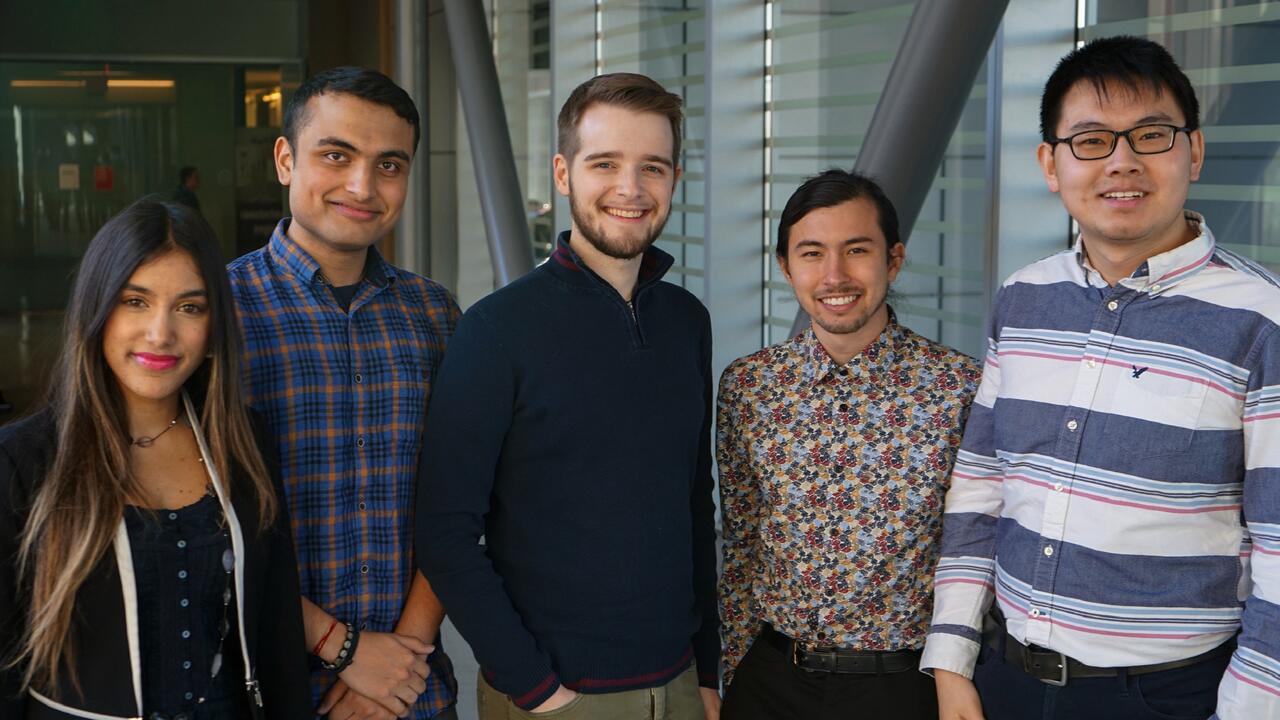
Making the global Dyson shortlist
Waterloo Engineering team Scope earns a spot in finals of international innovation contest

Waterloo Engineering team Scope earns a spot in finals of international innovation contest
By Brian Caldwell Faculty of EngineeringA team of former engineering students from the University of Waterloo has made a shortlist of finalists in a high-profile international invention competition.
Scope, which is developing a better zoom function for smartphone cameras and other applications, is one of 20 teams from countries around the world still in the running for the 2020 James Dyson Award.
"We're honestly honoured and humbled to be included with such amazing projects - it's really surreal," said Holden Beggs, co-founder and CEO. "We couldn't have imagined this even a year ago, but everyone's excitement for our vision and technology is the perfect fuel in the fire to make our vision a reality, and let millions of people take incredible photos."
The other four team members are Alisha Bhanji, Ishan Mishra, Fernando Pena Cantu and Zhenle Cao. They all graduated from the nanotechnology engineering program earlier this year after developing Scope for their Capstone Design project.
Finalists in the 27-country competition were chosen from 81 national winners and runners-up by a panel of Dyson Ltd. engineers at research labs in the United Kingdom, Singapore and Malaysia.
James Dyson, the well-known inventor of a bagless vacuum cleaner, will now personally pick the international winner of a US $50,000 prize, plus US $8,200 for their university, in November. A sustainability winner will also collect US $50,000, while two runners-up receive US $8,200 each.
Scope was named a runner-up last month in the Canadian leg of the annual contest, which challenges students to come up with innovative products and concepts that solve tangible problems.
“Within this shortlist are ideas, improvements and processes to help improve life as we know it,” the organization said today in a media release. “These 20 inventions show that young people from all corners of the globe want to address world-wide issues in a better, more sustainable and innovative way.”
Scope is developing lenses made of liquid crystals in a cell, not curved plastic or glass, that are zoomed by the application of voltage instead of physical movement. Advantages include space savings in compact cameras.
In addition to smartphones, the startup company is pursuing applications including use in augmented and virtual reality devices, machine vision and microscopes.
A second entry from Waterloo Engineering, SmartPatrol, was also a national runner-up in the competition for a warning system that uses computer vision to prevent injuries at ski resorts.
The winning Canadian team from the University of British Columbia also made the international shortlist for a catheter sensor that detects IV leaks.
Banner photo: Scope team members (left to right) Alisha Bhanji, Ishan Mishra, Holden Beggs, Fernando Pena Cantu and Zhenle Cao.

Read more
How Doug Kavanagh’s software engineering degree laid the foundation for a thriving career in patient care

Read more
Upside Robotics secures new funding to accelerate the future of sustainable farming

Read more
Redefining capstone learning by bringing students, faculty and community partners together to tackle real-world challenges
The University of Waterloo acknowledges that much of our work takes place on the traditional territory of the Neutral, Anishinaabeg, and Haudenosaunee peoples. Our main campus is situated on the Haldimand Tract, the land granted to the Six Nations that includes six miles on each side of the Grand River. Our active work toward reconciliation takes place across our campuses through research, learning, teaching, and community building, and is co-ordinated within the Office of Indigenous Relations.